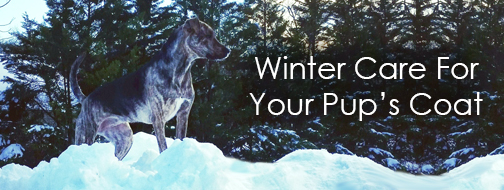show / hide sidebar
new
News
Winter Care for Your Pup's Coat
Posted on

The cold winter weather can wreak havoc on our skin. Low humidity contributes to skin that can become dry, cracked and uncomfortable. The same can be said for our pets’ skin as well. Here are a few tips to help ensure that your dog's skin and coat are properly taken care of during the winter months:
Brush Often. Dogs can be brushed every day, depending on their coat. This minimizes shedding and improves blood circulation, keeping mats and tangles at bay. Long haired dogs should be trimmed frequently to alleviate ice accumulation when outdoors. This will also help prevent them from bringing in salt and other harmful chemicals on their coat.
Shampoo less frequently. Soap/shampoo can dry out a dog’s skin much quicker during the winter months than in the summer. If you must bathe them frequently, try skipping the soap if their skin seems sensitive, or use an oatmeal bath to alleviate irritated skin.
Avoid Exposure to Heat Sources. Pet's gravitate toward heat sources like radiators and heat vents during the winter. Too much contact can cause drying of the skin and coat and, worst case scenario, your pet could suffer from minor-severe burns. Try making these areas as inaccessible as possible to you pup.
Watch their diet. During the winter months it is important to be mindful of your pet’s diet for many reasons. Dogs are less active during the winter months and what may have been the perfect portion over the summer could cause overeating when it’s cold. A healthy diet also improves a dog’s coat and skin. Adding too many treats or unhealthy portion sizes can cause skin to be irritated.
Drink lots of water. It takes more energy during the winter months for a dog to stay warm, which can contribute to dehydration if water is not readily available. Make sure the bowl is full at all times and your pup has access to water outdoors as well.
When it doubt, it is always best to consult your veterinarian for more information.
 Loading... Please wait...
Loading... Please wait...
